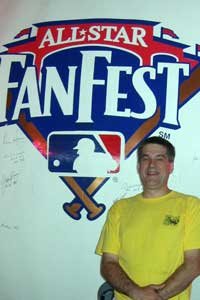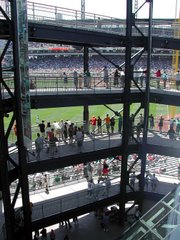The story goes that a guy tried to bluff his way into the American League team photo at the 1979 All-Star Game. Finally, he admitted he was an impostor.
"That's OK," said Cleveland pitcher Sid Monge. "So am I."
The possibly apocryphal tale illustrates how the Midsummer Classic often features players that don't quite go on to have the careers of the Schmidts and Carltons ... OK, the Seavers and the Fisks. At any rate, Monge is among those whose name sticks out a little more prominently in the annals of baseball because he was an All-Star for a day.
Monge actually was having a decent season when he got the call, compiling a 2.13 earned run average prior to the break on his way to a career year of 12-10, 2.40 ERA and 19 saves for the sixth-place Indians.
Some other pitchers who were All-Stars but aren't quite remembered in the same breath as Koufax:
• Jack Armstrong, Reds, 1990. "The All-American Boy" (although he, personally, was too young to remember the radio serial) entered the '90 season with six career wins but got off to a tremendous start, racking up an 8-1 record with a 1.55 ERA by the end of May. On July 5, he beat the Phillies to improve to 11-3, 2.28, and drew the All-Start start at Wrigley Field five days later. In two innings, he gave up one hit and struck out Jose Canseco and Mark McGwire. But it all came crashing down quickly for Armstrong, who won only one more game in '90, then posted records the next three years of 7-13, 6-15 and 9-17, with three different teams. He pitched his final game in the majors in 1994, at age 29.
• Tommy Byrne, Yankees, 1950. Casey Stengel selected his hurler for the All-Star Game, but didn't send him to the mound, even though the contest went a then-record 14 innings. Byrne, who now is 87 years old, is one of my favorite pitchers from a statistical anomaly standpoint. Early in his career, he had extreme difficulty throwing strikes. But as long as Byrne was with the Yankees, he posted very good records. In 1949, for example, he went 15-7 while walking 179 batters in 196 innings. He toned it down a bit during his All-Star season, issuing 160 bases on balls in 203 innings while going 15-9. In 1951, though, he got off to a horrible start, walking a total of 36 batters in three starts and six relief appearances; at that point, New York GM George Weiss figured the team would be better off with Byrne pitching for the St. Louis Browns, where he went in exchange for someone named Stubby Overmire. Amazingly, Byrne resurfaced in New York after sinking to the high minors, and with much better control, he posted a career-best 16-5 record in 1955.
• Fred Frankhouse, Braves, 1934. The second All-Star game was held at New York's Polo Grounds, the home park of the Giants' Carl Hubbell. And this was the contest in which Hubbell struck out five consecutive future Hall of Famers: Ruth, Gehrig, Foxx, Simmons and Cronin. NL pitchers Van Lingle Mungo and Lon Warneke squandered an early lead, and even Dizzy Dean got slapped around a bit in his three innings of work. Mopping up in the ninth was Frankhouse, just the 10th pitcher ever to appear in an All-Star game, and he acquitted himself well, giving up just a walk to Charlie Gehringer. Frankhouse finished the season 17-9, then won 11 games for the '35 Braves, a team that won an NL-record-low 38 contests. Frankhouse finished a respectable 106-97 for his 13-year career and lived to be 85.
• Tyler Green, Phillies, 1995. The rookie righthander took an 8-4 record with a 2.81 ERA, including two complete-game shutouts, into the All-Star break. He pitched a scoreless fifth inning in an eventual 3-2 NL victory. Green's numbers following the break were downright scary: In 44 2/3 innings, he surrendered 53 earned runs, going 0-5 and raising his season's ERA to 5.31. He missed the entire '96 season because of injury, then struggled to a 10-16 record in his final two seasons.
• Lee Grissom, Reds, 1937, and Marv Grissom, Giants, 1954. The Grissoms probably were the most unlikely brothers to be All-Stars. Lee, who made baseball lore by rowing a boat over the Crosley Field wall during a flood, finished 12-17 the year he got the call; for what it's worth, the first two batters he faced in the '37 All-Star Game were Lou Gehrig and Earl Averill, and Grissom struck them both out. His record for his career, which ended with a putrid Phillies team in '41, was 29-48. Brother Marv was a 36-year-old relief pitcher when he made the '54 team, retiring all four batters he faced in the game, wrapping things up by whiffing none other than Ted Williams. The Grissoms also were among the longest-living major-league brothers: Lee lived to be 90 and Marv, 87.
• Matt Keough, Athletics, 1978. Charlie Finley's penny-pinching had divested Oakland of all its established stars by '78, when the once-mighty A's ended up losing 93 games. Representing the team in the All-Star Game at Jack Murphy Stadium was Keough, whose father and uncle had played in the majors without being accorded that honor. Keough, a 22-year-old rookie, was 6-4 with a stunning 2.16 ERA going into the game. He relieved Jim Palmer in the third inning of an eventual AL loss, giving up a single to Ted Simmons and retiring Rick Monday. Keough then started a year-and-a-half nightmare during which his record was a miserable 4-28. He rebounded in 1980, going 16-13 with a 2.92 ERA and 20 complete games, but was out of the majors by age 30 with a lifetime mark of 58-84.
• Hugh Mulcahy, Phillies, 1940. As might be expected for a man whose nickname was "Losing Pitcher," Mulcahy did not pitch after being selected by Bill McKecnhie for the '40 NL team. As his Philadelphia teammate Kirby Higbe (with Martin Quigley) wrote in "The High Hard One": "They called us the Futile Phillies. ... About the middle of the season, old Hughie Mulcahy had won 10 and lost 9, and the sportswriters were saying he could be the first pitcher for win 20 for the Phils since Grover Cleveland Alexander. He pitched great ball but ended up something like 11-22." (Actually, it was 13-22.) Mulcahy was the first major-leaguer to be drafted for World War II and missed the entire 1941-44 seasons; by the time he returned in late '45, he won only a handful more games to finish his career at 45-89. "Losing Pitcher," indeed. He lived to be 88.
• Wayne Twitchell, Phillis, 1973. Steve Carlton turned in the most remarkable season ever for a pitcher in '72, winning 27 games - the last National Leaguer to do so - for a team that won a grand total of 59. Needless to say, he was the toast of Philadelphia going into '73, and he responded with a 4-2 record and 2.47 ERA in April. Then he started getting banged around, giving up six or more earned runs in six of his next 13 starts. By that time, Sparky Anderson was scouting for All-Stars, and Carlton's struggles steered the Redss manager in another direction when picking the Phils' representative. He settled on Twitchell, a 6-foot-6 hurler whose ERA had dipped below 2 by July 4. Twitchell pitched an inning at the beautiful new Royals Stadium, with the fountains wowing the TV audience, and he struck out Reggie Jackson. Twitchell finished third in the NL in ERA in '73, but never again was a very effective pitcher.
Friday, July 6, 2007
Subscribe to:
Post Comments (Atom)









No comments:
Post a Comment